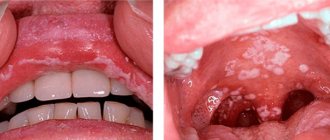Medical expert - Oksana Borisovna Lysenko.
Number of views: 555 192
Last updated date: 04/19/2021
Average reading time: 4 minutes
What discharge is considered normal Why does lingering discharge appear Signs of pathology The importance of maintaining good intimate hygiene during lingering discharge
Stretching vaginal discharge often frightens women and makes them think about the presence of inflammatory processes. In fact, viscous mucus from the genital tract does not always indicate any pathological conditions if there are no additional complaints. Sticky vaginal discharge serves a protective function and cleanses the genital tract. Mucous discharge maintains an optimal level of hydration, as well as comfort during intimate contacts. Depending on the phase of the menstrual cycle and the hormonal background of a woman, vaginal discharge can have different volumes and consistency.
When is vaginal discharge considered normal?
Like any mucous membrane, the surface of the vagina secretes a special secretion that can come out in small volumes. Such discharge, which has a light viscous consistency and transparent color, is considered physiological. They help maintain a balanced microflora in intimate areas of the body and prevent the proliferation of bacteria and fungi. The normal volume of discharge in a healthy woman outside of pregnancy is 1-2 ml. This volume includes a whole “complex” of secretions:
- Mucus of the uterus and cervical canal.
- Vaginal secretion.
- Vaginal transudate.
- Dead epithelium.
Laboratory studies of such secretions may show single leukocytes, representatives of the coccal flora in small numbers, and lactobacilli. The color of the discharge, when it is considered normal, is transparent or slightly whitish, without impurities or pus. Such discharge is odorless and does not cause irritation or inflammation in the vagina.
Increased discharge at the beginning of pregnancy is also normal and should not frighten the expectant mother.
An increase in the volume of discharge is often observed in women before or after sexual intercourse. In this case, there is no need to worry, since this is a natural lubricant of the mucous membrane, which is secreted during intimacy and helps not only to preserve microflora, but also to make sexual intercourse more “soft”.
Expert opinion
At your appointment, you can often hear complaints about the appearance of characteristic, lingering discharge, which is observed approximately in the middle of the menstrual cycle. This phenomenon is normal and indicates the onset of ovulation, so you should not worry about it.
Obstetrician-gynecologist of the highest category Oksana Anatolyevna Gartleb
When can discharge indicate the presence of a disease?
The daily discharge described above should not alarm a woman, as it is considered normal. The following signs may alert a woman:
- Increase in the volume of secretions.
- The appearance of an unpleasant odor of vaginal discharge.
- Blood appeared in the discharge.
- Curdled white discharge.
- Discharge with obvious presence of pus.
Expert opinion
The presence of blood in vaginal discharge is not a good symptom, which may indicate cervical erosion, endometriosis, or even cancer. At the same time, one should not exclude disruptions in the menstrual cycle, which may cause spotting in the middle of the cycle. Bloody vaginal discharge requires an urgent visit to a gynecologist and testing.
Obstetrician-gynecologist of the highest category Oksana Anatolyevna Gartleb
Discharge mixed with pus may indicate the presence of infections that are “acquired” through sexual contact: trichomoniasis, gonorrhea, chlamydia. In most cases, such discharge is accompanied by itching, burning, and painful sensations in the lower abdomen.
Curdled discharge is most often found with thrush, which is caused by a special type of opportunistic fungus. Symptoms of thrush also include vaginal dryness, irritation and pain during sexual intercourse.
Discharge with an unpleasant odor indicates that there is an infectious pathology in the body. A rotten or sour smell can occur as a result of the activity of pathogenic microorganisms. The most common diagnosis in this case is bacterial vaginitis, which is a serious disturbance in the composition of the microflora. They can be caused by stress, poor diet or immune disorders.
Be on the wave! Be with us!
Interesting fact.
Do you wake up wiping drool from your mouth?
Does this piss you off? Maybe it shouldn’t be at all! Although it may seem a little strange and even awkward if you share a bed with someone, drooling can mean that you are a completely healthy person, writes TipHero.
Why do we drool?
You probably know that drooling is normal for children, but it's actually quite common in adults, too. In fact, if you're reading this, you've probably drooled in your sleep at least once.
There's nothing to be ashamed of!
"We always have saliva in our mouths, and sometimes we sleep with our mouths open, so the saliva comes out, and that's what causes drooling," says Dr. Neil Cline, an internist and spokesman for the American Sleep Association in Lititz, Pennsylvania.
And saliva is good. In fact, experts say it's the first line of defense against tooth decay. So if you're a "drooler," your oral hygiene is better than that of your non-drooling peers.
Additionally, one of the main things you need to understand about saliva is that it usually comes out when you are sleeping peacefully. And when your body is relaxed, you can fully relax!
It's as if your brain forgets to tell your throat and mouth that you need to swallow saliva because you're deep enough into sleep.
This is important because sleep is one of – if not – the most important part of a healthy life. Poor quality sleep is one of the worst things for you.
You wake up tired, irritable and just feeling out of sorts all day. Your concentration levels will suffer greatly.
On the contrary, a good night's rest means less stress, better focus, and a well-functioning immune system.
In the morning you will immediately feel the difference and the effects of a night of rest and wakefulness. And drooling is a sure sign that you are sleeping calmly and peacefully.
This also means that you're most likely in REM (rapid eye movement) sleep, which is the deepest part of your sleep and is essential to getting the kind of quality sleep we're talking about.
While drooling is good, it's definitely a little awkward to wake up in a puddle of your own drool. So if you want to prevent this without losing quality sleep, try sleeping on your back.
"Back sleepers are less likely to drool than side or stomach sleepers," says Robert Axman, director of the North Carolina Lifestyle Sleep Institute.
Talk to your doctor - he will definitely advise you on some solution. Well, in the meantime, love your spit! She is not your enemy.
Do you drool while you sleep? Did you know that this is useful?
What to do when unpleasant discharge first appears?
Some women, when unpleasant discharge appears, do not know whether it is a sign of illness, and decide to observe for some more time. However, in the vast majority of cases, unpleasant symptoms do not disappear, and during this time the disease only becomes more complicated or its course worsens. That is why, if you experience unpleasant vaginal discharge that is not normal, you should visit a doctor as soon as possible.
Taking a smear from the vagina to determine microflora
To identify the cause of the violation, the doctor is required to take a smear for examination under a microscope in the laboratory. An examination on the chair is also necessary, during which the gynecologist will be able to assess the condition of the mucous membrane, identify foci of inflammation and diagnose the disease. Delayed visit to the doctor is not just a risk to your health in general and your reproductive system in particular. This is a direct path to the addition of additional infections that will have a detrimental effect on the entire body, worsening overall well-being. It's no secret that a woman's intimate health greatly affects even her appearance. Any hormonal disorders or diseases of the pelvic organs require the intervention of a qualified specialist and immediate treatment.
As an additional means for restoring vaginal microflora and eliminating unpleasant discharge, we can recommend the use of the Ginocomfort Intimate Restoring Gel.
The product was created by experienced specialists from the pharmaceutical company VERTEX and has a package of necessary documents and certificates. Clinical studies have proven its high effectiveness and good tolerance by women. The gel is recommended for eliminating vaginal discomfort, normalizing microflora and restoring the vaginal mucosa after infectious and inflammatory diseases and in the period after treatment with antibiotics. Sources:
- NEW OPPORTUNITIES IN THE THERAPY OF VULVA AND VAGINA PATHOLOGY. Ignatovsky A.V., Sokolovsky E.V. // Journal of Obstetrics and Women's Diseases. – 2009. – No. 1. – pp. 56-59.
- FACTORS OF PATHOGENICITY OF FUNGI OF THE GENUS CANDIDA AND THE POSSIBILITY OF THEIR REGULATION BY ESSENTIAL OILS. Kapustina O.A., Kartashova O.L. // Bulletin of the Orenburg Scientific Center of the Ural Branch of the Russian Academy of Sciences. – 2013. – No. 1. – P. 1-10.
- Pathogenic yeast-like fungi. Bezruchenko I.A. // Unified methods for laboratory diagnosis of candidiasis. - 2001. - No. 6. P.65-67.
- The effect of wormwood essential oils on the growth of microorganisms and their formation of biofilms. Kartashova O.L., Tkachev A.V., Utkina T.M. and others // Bulletin of the Orenburg Scientific Center of the Ural Branch of the Russian Academy of Sciences (Electronic journal). — 2012. No. 3.
- Persistence of pathogenic bacteria. Bukharin O.V. // M.: Medicine: Ekaterinburg: Ural Branch of the Russian Academy of Sciences. - 1999. - P. 366.
- https://www.healthline.com/health/vaginal-discharge
- https://www.emedicinehealth.com/vaginal_infections/article_em.htm
- https://familydoctor.org/condition/vaginal-discharge/
Why do stretchy discharge appear?
Stretchy discharge of increased viscosity appears as a result of changes in the body associated with preparation for conception. An increase in the amount of cervical mucus allows sperm to reach the egg faster and complete fertilization. The nature of vaginal discharge is influenced by the amount of estrogen and progesterone - female sex hormones. Immediately after menstruation, the discharge is slight and sticky. Shortly before ovulation, the mucus thins out, becomes viscous and elastic. Similar discharge also appears within 1–2 days after unprotected sexual intercourse. This is also considered the norm. If a woman is very bothered by viscous vaginal discharge, it is better to consult a gynecologist and undergo an examination. Some diseases, especially those of an inflammatory nature, can lead to increased production of vaginal secretions, but other health complaints are usually present.
Most often, the nature of vaginal discharge changes due to urogenital infections. They can appear not only due to unprotected intimate contacts, but also as a result of changes in the vaginal microflora under the influence of unfavorable external and internal factors. Hormonal imbalances, long-term use of antibiotics and a general weakening of the immune system contribute to changes in microbial balance.
Popular questions
I have discharge with an unpleasant odor, which gets worse after intercourse.
Could this be Gardnerellosis? And how to treat? First of all, you should consult an obstetrician-gynecologist and conduct an examination to determine the exact cause and identify pathogenic microflora. This will help you correctly draw up a treatment and recovery plan. While waiting for results, you can start using Gynocomfort gel with tea tree oil, which will have an anti-inflammatory effect and speed up the healing process. The gel is applied once a day for 14 days.
Today I noticed a brown discharge after using the toilet, and then it seemed to be the color of blood. Please tell me what this could be?
The appearance of discharge mixed with “fresh” or “old” blood from the genital tract not associated with menstruation is a reason for an early visit to an obstetrician-gynecologist.
Hello, I have been experiencing discharge with an unpleasant fishy odor, especially during sexual intercourse. I tried pimafucin suppositories, there were no results, please tell me what to do?
Hello! To clarify the diagnosis, I recommend conducting an examination - analysis of femoflora screening 12, which will clarify the cause of bacterial vaginosis. Before receiving the test result, you can begin treatment by using Elzhina complex suppositories for 6 days in combination with Gynocomfort gel with tea tree oil. The obtained result will allow you to adjust the treatment.
Hello. I really need your advice. Almost 2 years ago I was diagnosed with SUBMUCOUS UTERINE FIBROID. My doctor advised me to put on the Mirena IUD. In August 2021, I had a repeat ultrasound and the fibroid disappeared. I removed it a month ago. There appeared copious discharge with a disgusting odor and a yellow and occasionally brown tint. I can't move without panty liners. I didn't have periods with Mirena. How long should it take for menstruation to return and what should I do about my problem?
Hello!
After removal of the Mirena intrauterine therapeutic complex, menstruation is restored after approximately 1 month. Considering your complaints, it is important to make an appointment with an obstetrician-gynecologist as soon as possible, perform a smear on the flora and an ultrasound of the pelvic organs. This will allow you to prescribe the correct treatment. The stages of restoration of menstrual function depend on age, reproductive plans, concomitant gynecological and somatic diseases. For an accurate diagnosis, contact a specialist
Signs of pathology
When vaginal discharge is associated with gynecological diseases, additional pathological signs appear:
- pain in the lower abdomen and lower back;
- copious yellow-green discharge with an unpleasant odor or a cheesy consistency;
- discomfort during urination and intimate contacts;
- redness of the vulva, swelling of the external genitalia;
- menstrual irregularities, etc.
If the above signs are present, a woman should be wary. It is recommended to make an appointment with a gynecologist, tell the specialist about your problems and undergo a comprehensive examination. Based on the results of the examination and tests, the doctor can make a diagnosis and, if necessary, select appropriate treatment.







